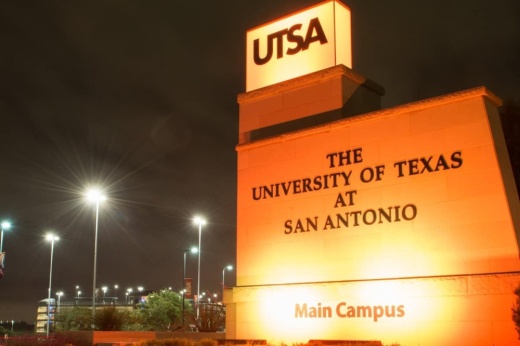The University of Texas at San Antonio’s recent designation of Tier One status positions the university to expand innovation partnerships and boost the local economy and workforce.
UTSA President Taylor Eighmy led a San Antonio Chamber of Commerce-hosted presentation June 23 at Embassy Suites San Antonio Northwest, where Eighmy extolled the potential benefits of having a Tier One institution of higher learning in San Antonio.
In February, UTSA officials announced the university had formally achieved R1, or Tier One, classification from the Carnegie Classification of Institutions of Higher Education.
According to UTSA officials, the Tier One designation acknowledges a high level of research activity at the Northwest Side university and aligns it with the nation’s top public and private research institutions.
UTSA is now one of 20 US universities designated as a R1 university and Hispanic-serving institution and one of six Tier One universities to feature National Centers of Academic Excellence. UTSA is also among 11 Texas universities with Tier One status.
Eighmy said the June 23 celebration involving the San Antonio Chamber of Commerce was designed to compliment the alignment of higher education, innovation, and job creation and retention—all meant to elevate the profile and prominence of San Antonio’s economy, talent pipeline and educational resources.
With more than 36,000 enrolled students and 6,000-plus employees, UTSA is a major employer that can affect the community and world in different ways, Eighmy said.
“Universities anchor our economy in a profound way,” Eighmy said.
Eighmy lauded the chamber and Greater:SATX Regional Economic Partnership for their support of UTSA and efforts to get the university a Tier One designation.
“[The chamber and Greater:SATX] were resolute in their advocacy for UTSA becoming an emerging research university,” Eighmy said.
According to Eighmy, with the Tier One status, UTSA is now on track to enhance existing partnerships and alliances and to capitalize on opportunities for new collaborations.
Earlier in June, UTSA announced it became a founding member of the Alliance of Hispanic Serving Research Universities, a consortium established by 20 of the nation’s top research institutions.
According to a UTSA news release, alliance members seek to advance social mobility and economic opportunities for Latino students and their communities by doubling the number of Hispanic doctorate students and raising the number of Hispanic faculty members by 20% at respective their institutions by 2030.
Eighmy said Tier One brings UTSA up to an even higher research and education standard, adding the university will further focus on what happens to students as they develop their skills and prepare to enter an ever-changing workforce.
“We are now being evaluated for elements on what we do for social mobility and economic opportunity for our students,” Eighmy said.
As UTSA looks to leverage its newfound Tier One status, the university continues to address growing student and researchers’ demand for resources citywide. Eighmy said the university will get to further take advantage of partnerships with local public agencies, private organizations and businesses that focus on such fields as high technology, manufacturing and health care.
Additionally, UTSA is expanding its downtown campus and plans to open its $90 million School of Data Science at 506 Dolorosa St. in early 2023.
UTSA officials said the School of Data Science will educate data scientists, lead data intensive research, and increase socioeconomic access and inclusion in an emerging educational field that many observers consider to be lacking diversity.
The June 23 event included a panel discussion where David Mongeau, the School of Data Science’s founding director, said the new school gives UTSA has a chance to ensure the student body and faculty reflect San Antonio’s cultural diversity.
Mongeau also said when computer science shook up the world of higher education decades ago, it did not benefit a wide variety of community members. UTSA’s School of Data Science will be the fifth US university campus of its kind and will play a key role in diversifying the growing data science field, he added.
“In data science, in the past couple of years, we’ve been talking about the need to keep it diverse and make sure everyone gets to participate,” Mongeau said.
Eighmy also said UTSA’s Tier One status and collaborations could indirectly help to bolster the number of UTSA students who decide to remain in the San Antonio area and enter the local workforce rather than move to places such as Austin or Boston, which have a wider variety of higher-paying jobs related to their field of study.
“We need to keep those folks here. Those young people need to love San Antonio,” chamber President and CEO Richard Perez said.
Greater:SATX President and CEO Jenna Saucedo-Herrera was part of the June 23 panel discussion. She said while diversity and population growth remain San Antonio’s strengths, educational attainment, or access to a comprehensive education, is still elusive for some local residents.
Saucedo-Herrera added the enhancement of UTSA’s educational and research resources can serve to lure more top talent to the university and boost the local workforce.
“The ability to attract top-tier faculty, the caliber of students that continue to be attracted to San Antonio—that helps us from a talent recruitment perspective, a talent retention perspective and certainly from a talent development perspective,” Saucedo-Herrera said.





